Holocaust Forgiveness Advocate Eva Kor
FRED DE SAM LAZARO, guest anchor: Now, a special report about a woman named Eva Kor. She’s a real estate broker in Terre Haute, Indiana, but her story is one of unthinkable loss and suffering as a child at the hands of Nazi doctors. It is also an extraordinary story of forgiveness. Judy Valente has our report, and we should prepare you — some of the images are graphic.
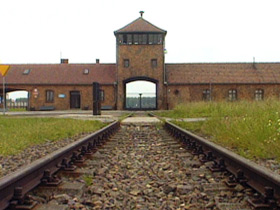
JUDY VALENTE: The year is 1995, 50 years after the liberation of the Nazi death camp at Auschwitz. As a child, Eva Kor was a prisoner at the camp. Now she returns on a mission.
EVA KOR (Holocaust Survivor, reading statement): I, Eva Mozes Kor, a twin who survived as a child of Josef Mengele’s experiments at Auschwitz 50 years ago, hereby give amnesty to all Nazis who participated directly or indirectly in the murder of my family and millions of others.
VALENTE: Kor’s proclamation of forgiveness made major news in Europe. It stunned other Holocaust survivors. But it was just the beginning of what was to become for Kor an abiding cause.
Ms. KOR: Forgiveness is nothing more and nothing less but an act of self-healing — an act of self-empowerment. And I immediately felt a burden of pain was lifted from my shoulder — that I was no longer a victim of Auschwitz, that I was no longer a prisoner of my tragic past, that I was finally free.
VALENTE: Since then, Kor has traveled the world speaking about her experiences at Auschwitz. Her message always comes back to the healing power of forgiveness.
UNIDENTIFIED MALE STUDENT (Bucknell University, Lewinsburg, PA): I want to know what forgiveness means to you.
Ms. KOR: Forgiveness to me means that whatever was done to me, it’s no longer causing me such pain that I cannot be the person that I want to be.
This is the last picture of the family. It’s in our apple orchard. And everybody here, except me, are dead.
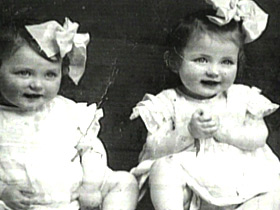
VALENTE: Kor was just 10 years old when she, her parents, two older sisters and her twin sister Miriam were taken from their village and forced into a cattle car bound for Auschwitz.
Ms. KOR: My mother was still holding onto us as an SS was running around and yelling in German, “twins!” And at that moment, another SS came and pulled my mother in one direction. We were pulled in the opposite direction. And we were left — Miriam and I — we were left holding hands, completely bewildered, crying, not knowing what will happen to us.
VALENTE: Kor and her sister would become human guinea pigs for cruel medical experiments — experiments conducted by Dr. Josef Mengele, known to the prisoners as “the Angel of Death.”
Eva recalls her first night at the camp.
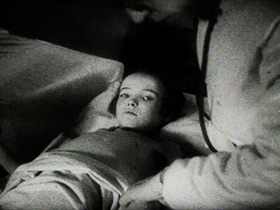
Ms. KOR: There on the filthy floor lie the scattered corpses of three children. And as I looked at them, I realized that that can happen to Miriam and me also unless I did something to prevent it. So I made a silent pledge that I would do anything within my power to make sure that Miriam and I shall not end up on that filthy latrine floor.
VALENTE: Eva and her sister were injected several times with unknown substances. They experienced fevers and other illnesses. Miriam suffered permanent kidney damage. But she and Eva survived.
Ms. KOR: I don’t think that after the war I was ever again religious. I question the existence of God. I don’t know if there is a God or not. And if there is, I want a debate when I go up there.
VALENTE: For decades Eva Kor struggled to make sense of the trauma she suffered at Auschwitz. Then an encounter with a death camp doctor changed her life.
That man was Dr. Hans Munch. After Miriam died in 1993, Kor was desperate to learn more about the experiments her sister underwent. A researcher suggested she track down some of the camp’s former doctors.
Ms. KOR: And we joked about it because I said, “You know, they are not advertising in the telephone book.” I mean, where will I find one of these guys?
VALENTE: Kor had seen Munch interviewed in a documentary. Much to her surprise, he agreed to meet with her at his home in Germany.
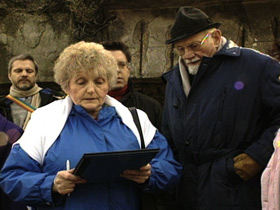
Ms. KOR: I was so scared. What I knew about the Nazi doctors I did not want to experience again. And what I discovered was that he was a very different Nazi, first of all. He treated me with the utmost respect. And he was extremely remorseful that he was part of that regime.
VALENTE: With Kor at his side, Munch read a statement describing the atrocities he had witnessed. He apologized to the victims. Kor offered her forgiveness, even to Dr. Mengele.
Ms. KOR: I realized then that I even had the power to forgive the god of Auschwitz — this angel of death. And I said, “Yes, I do. Wow.” And it made me really feel good to realize that I have that power.
VALENTE: Over the years, Kor has led 11 tours to Auschwitz, groups made up mostly of Indiana school teachers.
PEGGY GRABOWSKI (Teacher): When you hear her story and you hear about the atrocities and what happened to her family, to have that message of forgiveness, I mean, it’s incredibly inspiring.
VALENTE: In memory of her sister, Kor founded a Holocaust museum in Terra Haute. She funds the museum largely through her own earnings as a real estate broker, as well as outside donations and the sales of her book. Her husband Mickey, another survivor, helps out.
MICKEY KOR: The story has to be told and you’re doing a great job.
Ms. KOR: Oh well, thank you. You play your piano.
Mr. KOR: If I had the power I would give you an Academy Award. But I don’t work in those circles.
Ms. KOR: A Nobel Prize would be OK too.
Mr. KOR: Nobel Prize?
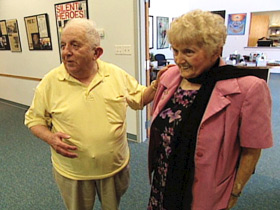
Ms. KOR: There’s a million dollars going with it. We could use it for the museum.
VALENTE: Kor’s message of forgiveness has drawn criticism from many of her fellow survivors. Even her husband doesn’t think he can ever forgive his Nazi tormentors.
Mr. KOR: You can’t put into words what we went through — what I went through.
Ms. KOR: I call forgiveness the modern miracle medicine. You don’t have to belong to an HMO. There is no co-pay, therefore, everybody can afford it. There are no side effects. And if you don’t like the way you feel without the pain of the past, you can always go and take your pain back.
VALENTE: Eva Kor is now 73 years old. Despite her age and the criticism she’s received, she vows to press on.
Ms. KOR: I know that I won’t live forever. So in order to continue the lessons that I have learned, I must have young teachers carry on. Giving up in Auschwitz for one single moment would have meant for me to die. And that feeling is always with me. When I am working on something important, I cannot give up.
VALENTE: For RELIGION AND ETHICS NEWSWEEKLY, I’m Judy Valente in Terre Haute, Indiana.

